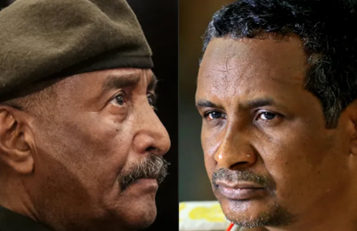Monthly Afghanistan News Roundup – April 2023
Ozair Khan
Within the framework of the Fiqhi Pathways project implemented jointly by CPI-Geneva and the Peace and Human Rights Division of the Swiss Federal Department of Foreign Affairs, engagement with Deobandi scholars of or close to Taliban and Pakistan is pursued to promote governance in line with IHL and Islamic jurisprudence through Fiqhi dialogue exchanges. This monthly newsletter hopes to keep track of the discussions and debates among scholars on issues of governance policies of the Taliban, especially in the areas of education, social policies, and statecraft and governance institutions.
- Taliban’s response to security challenges
An audio message from IS-K leader Shihab al-Muhajir was widely shared online at the beginning of April. He explained that the situation in Afghanistan was increasingly difficult and that “not many of us are left.” The Taliban have launched several operations against IS-K, killing several high-ranking members, such as the mastermind (his name has not been released yet) behind the explosion at Kabul airport in August 2021. For this reason, Zabihullah Mujahid, Islamic Emirate of Afghanistan (IEA)’s spokesman, said that IS-K is considered “a 1% problem” and that the international community should stop using the terrorist threat in Afghanistan as an excuse for not helping and recognizing Afghanistan.[1]
From the Pakistani side, During the 41st National Security Council meeting on April 7, Prime Minister Shehbaz Sharif announced the launch of a new operation to eliminate the Tehrek e Taliban Pakistan threat (TTP, also known as the Pakistani Taliban). This armed group has been highly active in the Pashtun regions with almost daily attacks. Participants at this meeting again criticized the Islamic Emirate for being friendly with the TTP and granting them sanctuaries. This frustration culminated with Pakistan’s defense minister, Khawaja Asif, who threatened that Pakistan would bomb terrorist hideouts inside Afghanistan if the de facto rulers in Kabul could not rein in anti-Pakistan militants. Moreover, according to some officials, Afghan nationals have been actively helping TTP by partaking in their attacks. Finally, during this NSC meeting, the previous government of Imran Khan was heavily criticized for its policies of trying to engage with TTP.[2]
- Internal governance
Three months after the IEA ban on female Afghan NGO workers, they banned Afghan women from working for the UN. This ban has again stirred up the debate regarding the utility of international organizations and whether NGOs should stay in Afghanistan. Taliban claims this decision is culturally motivated. Still, experts on the context, such as Sepi Azarbaijani-Moghaddam, say this decision is a reaction to the international community’s lack of recognition and criticism.
With this newest decree coming from Kandahar, we can see the growing importance of the region through the fact the leading spokesman for Afghanistan’s Taliban administration, Zabihullah Mujahid, will relocate his office from Kabul to the city of Kandahar, the birthplace of the Taliban and where the movement’s leader resides. It indicates the centralization of the power in the hands of Haibatullah Akhunzadah and his council at the expense of government bodies in Kabul.[3]
Another crucial piece of information related to the IEA’s intern policies is that Zabihullah Mujahid informed the Afghan news outlet Tolo News that the constitution is being drafted according to the Sharia. This will solidify the IEA’s claim of being a sovereign country, and it will clarify the governmental structure in terms of decision making.[4]
- Islamic jurisprudence diversity challenge
The Taliban have sent a delegation of Shia scholars led by one of their sympathizers, the religious leader Muhammad Akbari to Iran and Iraq to assure Shia scholars that the Taliban have a good relationship with the Afghan Shias. However, the Taliban, at a national level, only promote Afghanistan as primarily a nation with a Sunni Hanafi religious background. The Shia Afghan religious council has asked the Taliban authorities to mention the Shia Jafari school of thought in the national curriculum, but their request was denied.[5]
On the Salafi front, a Twitter account run by adherents to “quietest Salafism” has reported intense pressure from the Islamic Emirate to stop praying distinctively from Hanafis. Salafis are known to fold their hands and arms on their chest while praying, which differs from the Hanafis’ way, who pray with their hands folded lower than the chest. The Taliban intelligence official Mullah Munib explained he summoned Salafi clerics from Kandahar province and told them that “preaching Salafism and Wahhabism in any small or large gathering is prohibited.” This is due to the Taliban’s fear that any Salafi is a potential IS-K militant.
- International dialogue
Uzbekistan hosted a meeting of the foreign ministers of Afghanistan’s neighboring countries in Samarkand on April 13. The countries represented were China, Pakistan, Iran, Tajikistan, Uzbekistan, and Turkmenistan. The meeting was specifically dedicated to Afghanistan issues. Although the joint declaration released after the panel suggests the participants discussed various points, the real motive, according to Bashir Safi, a security analyst, was addressing the terrorist threat coming from Afghanistan.[6]
It was also announced the UN will host a meeting of envoys on Afghanistan from many countries in Qatar on May 1 to discuss the way forward with Afghanistan. During a talk at Princeton University, UN Deputy Secretary-General Amina Mohammed explained that one of the themes discussed during this meeting would be the potential recognition of the Islamic Emirate because of the need for engagement with the Taliban authorities. This declaration created quite a stir because of the recent controversial decisions taken by Haibatullah Akhunzadah, who released a message for Eid: “I have promised Allah that as long as I am alive, not a single law of infidels will find a place in Afghanistan.” Due to the uproar, UN spokesman Farhan Haq attempted to downplay Mohammed’s remarks, saying the deliberations at the meeting in Doha would not focus on recognition but rather the way forward on how to deal with Afghanistan. The UN decided not to invite Afghanistan.[7]
[1]https://twitter.com/A_Jahid_Jalal/status/1642597674250534912?t=C_zD-nKC6aYMYyp4-HW9dA&s=09
[2] https://www.dawn.com/news/1746397
[3] https://www.reuters.com/world/asia-pacific/afghanistans-taliban-move-spokesmans-office-kandahar-2023-04-06/
[4] https://tolonews.com/afghanistan-183102
[5]https://twitter.com/ZawiaNews/status/1645383866142580743?t=6A-n6E7JYniaffde2z6CXA&s=19
https://www.bbc.com/persian/articles/c3g5yvpwqe
[6]https://asia.nikkei.com/Politics/International-relations/Afghanistan-turmoil/China-Russia-Pakistan-others-push-Afghan-Taliban-on-terrorism
[7]https://www.google.com/amp/s/www.voanews.com/amp/us-rules-out-talks-on-afghan-taliban-recognition-at-un-hosted-meeting-/7059359.html










